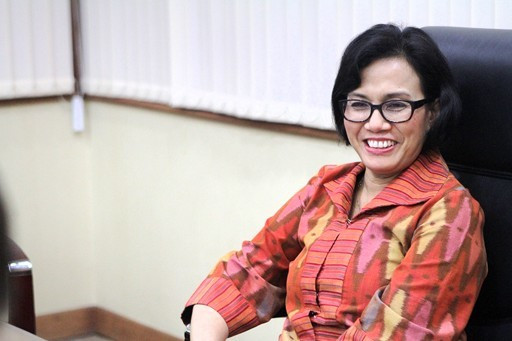News
State revenue nosedives, fueling speculation over Sri Mulyani’s exit
Tenggara Strategics March 18, 2025 Sri Mulyani Indrawati (JP/Donny Fernando) (JP/Donny Fernando)
Sri Mulyani Indrawati (JP/Donny Fernando) (JP/Donny Fernando)
After a month-long silence, the Finance Ministry has finally released the state budget (APBN) performance report for January, in tandem with the February 2025 report. The delay had already stirred speculation about internal tensions within the ministry, including persistent rumors of Finance Minister Sri Mulyani Indrawati’s possible resignation.
When the report was finally published, it revealed troubling news, a sharp drop in January’s state revenue to just Rp 157.32 trillion (US$10.02 billion), a steep fall of 28.3 percent from Rp 219.31 trillion recorded in the same month last year. A key driver of this shortfall was a massive slump in tax revenue, which fell by a staggering 41.9 percent from Rp 152.89 trillion in January 2024 to just Rp 88.89 trillion this year. This plunge led to a budget deficit of around Rp 23.45 trillion, or approximately 0.1 percent of the country’s GDP.
The poor revenue performance triggered what the government referred to as “APBN efficiency measures”, resulting in a Rp 8.99 trillion budget cut in February, around 17 percent of the initially allocated Rp 53.19 trillion. Despite these efforts to rein in spending, the January and February APBN still recorded a realized deficit of Rp 31.2 trillion, or 0.13 percent of GDP.
In response, Finance Minister Sri Mulyani emphasized during a press conference that the 2025 state budget had been designed to accommodate a deficit of up to 2.35 percent of GDP. In her view, the figures from the first two months, while troubling, were still within the “safety zone.”
Still, the severity of the revenue drop and the widening deficit have raised serious questions about the government’s fiscal direction. They have also drawn fresh attention to tensions within the Finance Ministry itself. Sri Mulyani had previously warned of the need to boost state revenue to safeguard fiscal sustainability. Up until late 2024, she had strongly advocated for raising value added tax (VAT) from 11 percent to 12 percent, a move justified by the long-term need to strengthen the budget and reduce reliance on debt.
That plan, however, was abruptly reversed. Just days before the new VAT rate was set to take effect in January 2025, President Prabowo Subianto announced a last-minute adjustment to the tax harmonization law implementation, stipulating that the VAT hike would apply only to luxury goods such as yachts, jets and high-end residences, while the rest of the economy would remain taxed at 11 percent.
The announcement came so late that some businesses had already implemented the 12 percent VAT rate, later issuing refunds to customers who had overpaid.
This reversal was widely seen as a clear sign of Sri Mulyani’s waning influence within the Finance Ministry. She had been one of the most vocal proponents of the VAT hike, and the government’s decision to scale it back, reportedly without her full endorsement, only deepened speculation that her standing within the cabinet is weakening. That speculation intensified further following the sudden arrest of Isa Rachmatawarta, the director general of budgeting and a known ally of Sri Mulyani.
To understand the underlying political dynamics, it helps to consider the internal divide within the Finance Ministry. On one side is Sri Mulyani and her supporters, who champion fiscal discipline and caution in state spending. On the other side are figures more closely aligned with President Prabowo, led informally by Deputy Finance Minister Thomas Djiwandono, Prabowo’s nephew. This camp supports looser fiscal policies in pursuit of the administration’s ambitious goal of achieving 8 percent economic growth.
Whether Sri Mulyani will step down remains uncertain. Her resignation would mark a major shift not only within the Finance Ministry but also in the broader political landscape. She is widely regarded as a credible and experienced finance officer with a strong international reputation. Her continued presence in Prabowo’s cabinet has also served to counter criticism that the administration is dominated by loyalists and lacks ideological diversity.
Should Sri Mulyani resign, many expect her successor to be Deputy Minister Thomas. Such a transition would likely cement perceptions of growing political consolidation within the ministry and raise concerns, both domestically and abroad, about the erosion of independent voices in the Prabowo administration.
What we've heard
Several internal sources have said the government’s delay in releasing the state budget (APBN) performance report was largely due to underwhelming results across key indicators. As a result, the Finance Ministry was hesitant to publish the January 2025 expenditure figures. Remarks made by Finance Minister Sri Mulyani Indrawati on Thursday only reinforced earlier concerns already circulating among market players.

